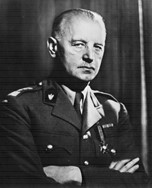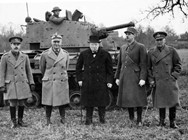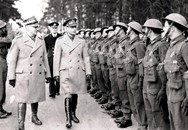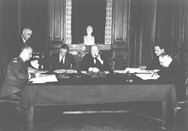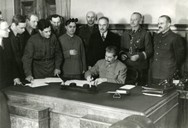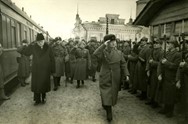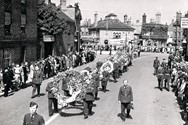General Władysław Sikorski
Born May 20th 1881 and died on July 4th 1943, Gibraltar.
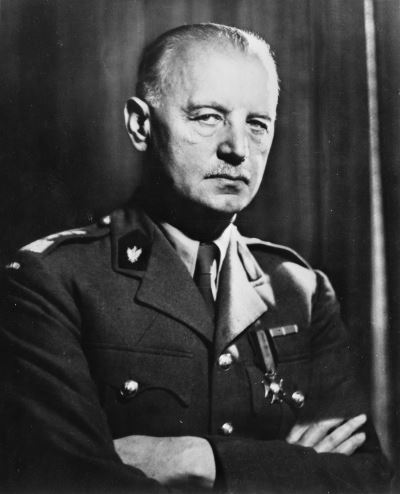
General Sikorski was born in Tuszów Narodowy, Galicia, at the time part of the Austrian partition of Poland. His father was Tomasz Sikorski, a school teacher; his mother was Emilia Habrowska.
Prior to the First World War, he established and participated in several underground organizations that promoted the cause of the independence of Poland. He fought with distinction in the Polish Legions during the First World War, and later in the newly created Polish Army during the Polish-Soviet War of 1919 to 1921. In that war he played a prominent role in the decisive Battle of Warsaw. In the early years of the Second Polish Republic, Sikorski held government posts including prime minister (1922 to 1923) and minister of military affairs (1923 to 1924). During his brief tenure as prime minister, he became popular with the Polish public and carried out essential reforms in addition to guiding the country's foreign policy in a direction that gained the approval and cooperation of the League of Nations and tightened Polish-French cooperation. He obtained recognition of Poland's eastern frontiers from the UK, France and the United States during the Conference of Ambassadors on 15th March 1923.
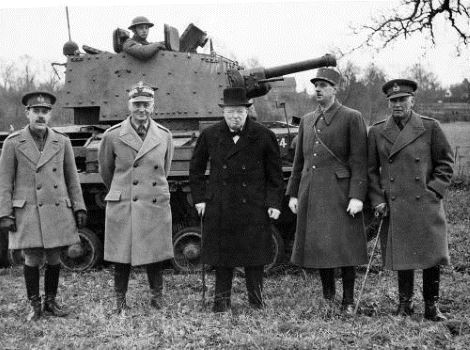
General Sikorski with Churchill and De Gaulle.
Following Józef Piłsudski's May Coup of 1926 and the installation of the Sanacja Government, he fell out of favour with the new regime. Despite their differences, Piłsudski praised Sikorski in his reports, recommending him for Chief of the General Staff and Minister of War positions; only Generals Kazimierz Sosnkowski and Edward Rydz-Śmigły (b.11th March 1886 Łapszyn Nr. BrzeŜany Galicia - d. 2nd December 1941 Warsaw) received better evaluations from him. Sikorski was popular among many soldiers, and in politics, particularly appealing to Polish conservatives and liberals.
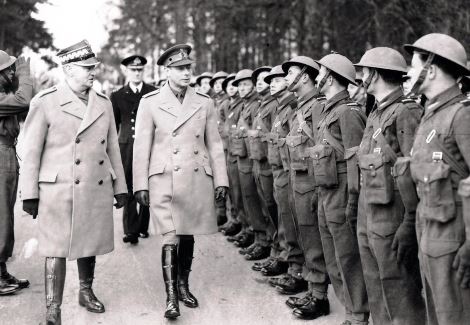
Reviewing Polish troops with King George VI.
Even after the death of Piłsudski in 1935, he was still marginalized, politically and militarily, by Piłsudski's successors. In February next year, together with several prominent Polish politicians (Wincenty Witos, Ignacy Paderewski, and General Józef Haller) he joined the Front Morges, an anti-Sanacja political grouping. Front Morges formed a new organization, the Labour Party (Stronnictwo Pracy) which was one of the parties which constituted the political basis for the Polish Government-in-Exile during 1939-1945.
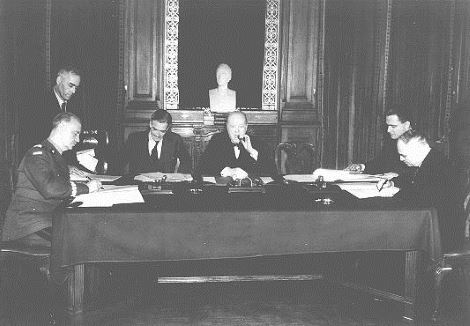
Churchill and foreign secretary Eden host the signing of a pact between the Soviet Union, represented by Soviet ambassador Maisky, and the Polish Government-in-Exile, represented by General Sikorski. London, 30th July 1941.
Sikorski escaped through Romania to Paris, where on 28th September he joined Władysław Raczkiewicz and Stanisław Mikołajczyk in a Polish Government-in-Exile, taking command of the newly formed Polish Armed Forces in France. His government was recognized by the Western Allies. Nonetheless Sikorski 's government struggled to get its point of view heard by France and the United Kingdom. The western Allies refused to recognize the Soviet Union as an aggressor, despite the Soviet invasion of Poland on 17th September 1939. On June 19th, 1940, Sikorski met with British Prime Minister Winston Churchill and promised that Polish forces would fight alongside the British until final victory.
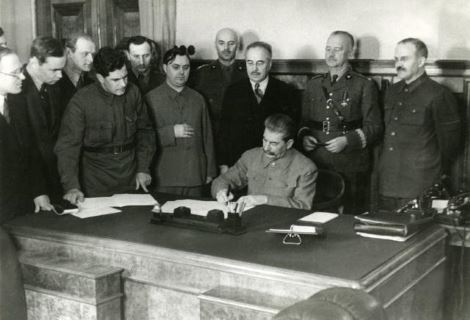
Stalin signing the Polish-Soviet Declaration on Friendship and Cooperation. 4 Dec. 1941. Malenkov is on Stalin's right, with his right hand on his tunic. General Anders stands between Malenkov and Polish Ambassador Stanislaw Kot, with General Sikorski, followed by Molotov, on Sikorski's left.
Sikorski and his Government moved to London and were able to evacuate many Polish troops to Britain from France. After the signing of a Polish-British Military Agreement on 5th August 1940 they proceeded to build up and train the Polish Armed Forces in the West. The Fall of France weakened Sikorski's position and his proposal to consider building a new Polish army in the Soviet-occupied territories led to much criticism from within the Polish community in Britain. On 19th July, Raczkiewicz dismissed him from his position as the Prime Minister, replacing him with August Zaleski, however within days pressure from Sikorski's sympathizers, including the British Government, made Raczkiewicz reconsider his decision and Sikorski was reinstated as the Prime Minister on 25th July.
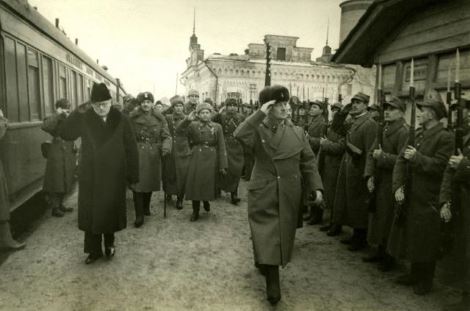
General Sikorski marching past the guard of honour during an inspection of Polish troops released by Stalin in Buzuluk, USSR, December 1941.
During the Second World War, Sikorski became Prime Minister of the Polish Government- in-Exile, Commander-in-Chief of the Polish Armed Forces, and a vigorous advocate of the Polish cause in the diplomatic sphere. He supported the re-establishment of diplomatic relations between Poland and the Soviet Union, which had been severed after the Soviet pact with the Nazis for the invasion of Poland in 1939. However, Soviet leader Joseph Stalin broke off Soviet-Polish diplomatic relations in April 1943 following Sikorski's request that the International Red Cross investigate the Katyń Forest massacre.
In July 1943, a plane carrying Sikorski plunged into the sea immediately after take-off from Gibraltar, killing all on board except the pilot. The exact circumstances of his death have never been fully explained, especially when certain files have had their status extended as top secret for 100 years and the act of a third party has not been ruled out. Sikorski had been the most prestigious leader of the Free Poles, and his death was a severe setback for the Polish cause.
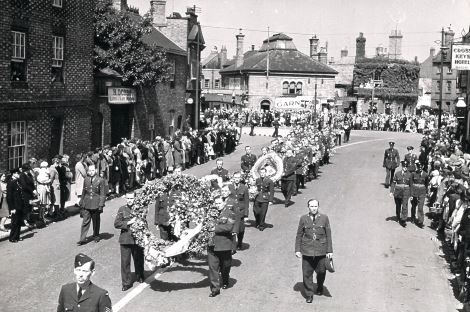
General Sikorski's funeral procession headed by the Polish Government-in-Exile, Newark, Nottinghamshire, 16th July 1943.
